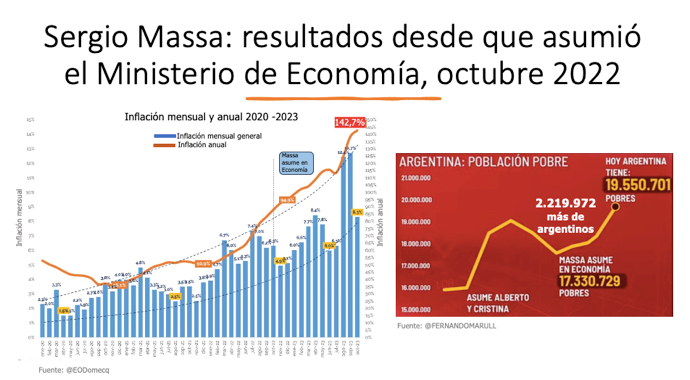





|
Tweet
|
|
|
“If you tell a lie big enough and keep repeating it, people will eventually come to believe it”. - Joseph Goebbels
This Sunday, November 19th, Argentinians face a critical decision: to continue with the impoverishing model that has prevailed since the triumph of democracy or to embrace change. The choice for continuity lies with Sergio Massa, the current Minister of Economy, who now positions himself as a centrist Peronist. The alternative for breaking this continuity rests with the controversial Javier Milei. For 78 years, Argentina has been under the influence of Peronism, shaping a culture focused on statism, trade unions, and economic nationalism. José “Pepe” Mujica describes it as more of a “mysticism” than a traditional political party. The Argentine national sentiment includes populism - a poverty factory. The usual electoral maxim that “it’s the economy, stupid” doesn’t apply in Perón’s land. Most Argentinians expect the State to provide for their survival, seemingly indifferent to significant corruption scandals (involving figures like Julio “Chocolate” Rigau, Martin Insaurralde, and Cristina Fernández), inflation, and currency devaluation during the two decades of Kirchnerism. The stakeholders of this regime operate akin to a criminal enterprise, focused on maintaining power at all costs. Four years ago, the political landscape was dominated by Alberto Fernández, with Cristina de Kirchner, a vice president, reluctant to relinquish power. Their narrative was about getting “Argentina back on its feet”, proposing a grand agreement among the State, workers, and producers. Today, Sergio Massa emerges as an architect of consensus and dialogue, aiming to establish a national unity government that brings together the most qualified individuals to drive Argentina’s social and economic transformation. In his 15 months as the superminister of Economy, Massa has failed to get Argentina “back on its feet”. He blamed the IMF debt, the pandemic, and the El Niño phenomenon. However, statistics indicate an 11% increase in poverty under his watch. As per the National Institute of Statistics and Census, 40.1% of the population, equating to 18.6 million Argentinians, fell below the poverty line in the first half of this year. The consumer price index has sharply increased over the past two years. In 2022, inflation closed at 94.8%. The October year-over-year rate was 142.7%, one of the highest globally. Since Massa assumed the role of superminister, inflation has tripled, purchasing power has fallen by 41%, the number of poor has increased by 2,219,972, and for the first time, there are poor workers. To address this reality, Kirchnerism faded from the electoral scene yet remains critical in the lineup of a new Peronist government. Additionally, Massa has implemented the “Plan Platita” to reinforce social control over the population, instilling fear of change and creating a belief that, even though things are bad now, they could get worse under Milei. Massa has distributed nearly 2% of the GDP (5.5 billion dollars) in bonuses for retirees, fixed sums for workers, freezes on tariffs and price agreements, VAT reductions on food, tax relief for self-employed individuals and credits, including the removal of the fourth category of Income Tax, according to LN+ journalist Luis Majul. The focus of the electoral campaign has been the strengthening of populism - a kind of mysticism - deeply rooted in the Argentine collective unconscious, with the strong presence of the State in everyday life, from public education and health to transport subsidies. Moreover, the November 19th election impacted the geopolitical axis. Lula da Silva risks losing an ally in the global power geometry, seeking to reconfigure financial, investment, and trade patterns with China, which is strengthening its ties with the Global South and diversifying its relations with the West. Additionally, a change in administration in Argentina could signify the return of liberal governments in Latin America, threatening the projects of the Puebla Group and the Sao Paulo Forum. Massa’s promise of a different and united government seeks to perpetuate the culture of poverty and deeply ingrained populism in Argentina. The November 19th election is more than a political choice; it’s a battle between continuing an impoverishing model, a “kind of mystique,” and the possibility of a new path toward freedom. Argentina’s future hangs in the balance, and its decision will echo not only in its destiny but also in the geopolitical equilibrium of Latin America and beyond. |

